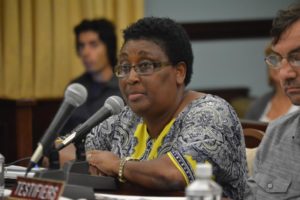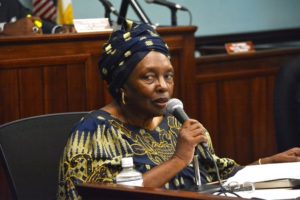
The V.I. Legislature will hold a special session Friday Oct. 26 to vote on a ballot measure to create new districts for the territory.
Meanwhile, some senators, legal counsel for the Legislature and a Republican member of the V.I. Board of Elections have opined the measure may run afoul of the U.S. Constitution’s equal representation requirements and U.S. Supreme Court precedent mandating roughly equal voter representation within a territory or state.
The civic group St. Croix Government Retirees Inc. and its president, Mary Moorhead, circulated a petition for a ballot initiative to split the territory into five districts and elect more senators at large. The group got enough signatures to get the measure on the ballot. The Revised Organic Act of 1954, the federal law that acts as a constitution for the territory until such a time as the territory enacts one of its own, says the Legislature has 30 days to approve or disapprove the initiative.

If it approves, the changes are enacted. If it disapproves, it goes on the Nov. 6 general election ballot or, if that is not feasible, on its own ballot for a special election within 90 days of the general election. During recent legislative hearings on the measure, Election Supervisor Caroline Fawkes told senators if the Senate did not act by Oct. 31, the measure would have to be considered at a special election.
The Legislature can also propose a second, alternative ballot initiative, alongside this one, for voters to choose between – or choose neither.
To become law, a majority of the voters in the territory must vote on the measure and a majority of those voting on it must vote in favor. If it passes, it is the law of the territory. But federal courts could weigh in on whether the change violates the U.S. Constitution, its bill of rights or federal law.
Currently, the territory elects 15 senators, with seven for St. Croix, seven for St. Thomas and one “at large” elected territory-wide, who is traditionally from St. John, although there is no legal requirement for that. The top seven vote-getters in each district are elected, so the final person to be seated may receive only a fraction of the votes of the top vote winner.
No other U.S. territory or state has a similar system for electing legislators.
Under the proposal, the territory would be split into five districts: two on St. Croix; two on St. Thomas and one on St. John. There would still be 15 senators. The St. John district would have one senator and each of the St. Thomas and St. Croix districts would have two senators. Then three senators who reside on St. Croix and three who reside on St. Thomas would run at large, to be elected by all the voters of the Virgin Islands. This would mean six senators would be elected at large.
Only an at-large senator could be chosen to be president of the Legislature.
The initiative proposal also makes slight changes to senatorial allotments. Under current law, each senator has a base allotment of 2 percent of the Legislature’s budget – or $400,000 per year – for office expenses and personal assistants. Senate officers get additional amounts. The initiative proposed makes slight changes to the language of the current law to account for the changes in how senators would be elected and officers of the Legislature chosen.

Legislative Legal Counsel Yvonne Tharpes issued a legal opinion urging the Legislature not to accept the initiative, which would put it on the ballot.
Tharpes wrote in part that “the constitutional equal protection requirements for fair representations will not me met under this proposal,” and that it lacks any means for drawing the districts.
“It is not sufficient merely to declare that there are five districts and name them as St. Croix East, St. Croix West, St. Thomas East, St. Thomas West and St. John,” Tharpes wrote.
Tharpes also sat on the V.I. Titling Board and voted in April to approve the ballot question’s wording.
Republican member of the V.I. Board of Elections Jevon Williams issued a statement Thursday echoing those same constitutional concerns about “one person, one vote.” Williams said if the measure moves forward, as a member of the Board of Elections, he will request a review by the U.S. attorney for the territory and the Voting Section of the U.S. Department of Justice. He also said he would “work with the congressional committees that oversee the territories” to see if the Revised Organic Act of 1954, the federal governing the territory, could be changed to achieve similar ends.
That same federal law envisions the U.S. Virgin Islands creating its own constitution. It gives the Legislature power to write and enact a constitution or create a process to write a constitution. A new constitution could change the size of the Legislature, create new districts and set up at large representation, among many other possibilities, so long as it comported with the U.S. Constitution and federal law. The territory has had five constitutional conventions to try to do so, without success. The most recent convention produced a document rejected by the U.S. Department of Justice for violating several provisions of the U.S. Constitution. (See: V.I. Answer Desk: What Is the Status of a V.I. Constitution?)
Editor’s note: The session was originally scheduled for Wednesday but was moved to Friday due to Gov. Kenneth Mapp calling a special session for that day to consider tuition legislation.






The initiative is 100% unconstitutional but so is the current apportionment of the V.I. Legislature, as it also isn’t based on population. I would wager that even the V.I. Board of Elections, since the seats are districted without regard to population, would also be found unconstitutional by a federal court if this was ever litigated. There is a major voting rights issue here as well because the Virgin Islands is the reverse of many states. Blacks are a majority. Therefore, whites and hispanics could make a claim to the minority protections afforded under the Voting Rights Act. If you look at the V.I. Legislature and other elected offices, it’s clear that minorities in the Virgin Islands (whites and hispanics) are disenfranchised and under-represented because of the present system of electing at-large within St. Thomas and at-large within St. Croix.
Thank you for publishing photographs of the people named in the article. It’s good to be able to put a face with a name. Please continue to do so. It may even aid in the cause of pushing for accountability for ones actions.
There is an error in the reporting here. The initiative does NOT “make slight changes to senatorial allotments”. The initiative changes only relate to how senators are chosen, nothing else. The group proposing the measure “envisions” many other changes – to allotments and assigned senatorial responsibilities – but these changes are NOT in the initiative as it will appear on the ballot. Here is the ballot measure description in its entirety:
The question that was approved by the Titling Board in April to be asked on the ballot starts by explaining the proposal: “Title 2, Chapter 6 of Virgin Islands Code entitled Apportionment of the Legislature is amended to read as follows: There are five Legislative Districts with 9 district senators and 6 at-large senators: District of St. Croix East shall have two senators, District of St. Croix West Shall have two senators, District of St. Thomas East shall have two senators, District of St. Thomas West Shall have two senators, District of St. John shall have one senator, voted on by the qualified electors of the respective districts. The proposal further states that there shall be six at-large senators, “three shall be residents of St. Croix and three shall be residents of St. Thomas, voted on by the qualified electors of the Virgin Islands Code.”
The question then asks: “Shall this proposal become law?”